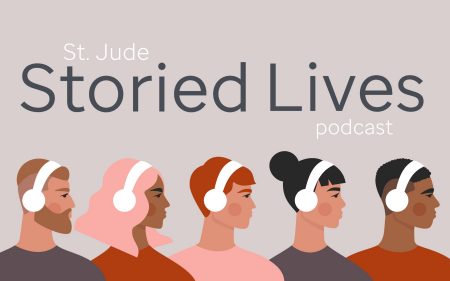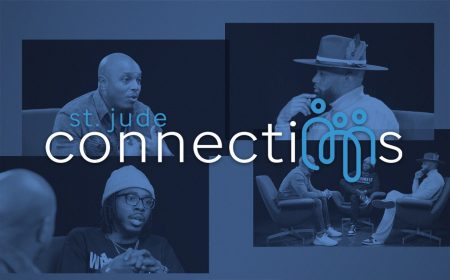
Going 'Home from St. Jude' with lights flashing and sirens blaring was easy part
Met by a limousine and escorted by a dozen emergency vehicles, it was the ride of a lifetime for Luke after cancer treatment at St. Jude Children’s Research Hospital.

October 17, 2022 • 9 min
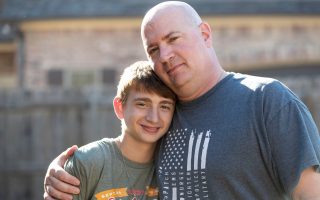
Luke counted down the hours of the drive from Memphis to Shreveport, Louisiana, punching his dad’s arm every hour and announcing, “Five more hours.”
Another punch and, “Four more hours.”
They had left early that morning in his dad’s truck, a mud-colored 2017 Nissan Titan that Luke hoped to finagle when he was old enough to drive. He pressed his feet against the floorboards as if that could make his state trooper dad go faster.
Punch. “Three more hours.”
Luke was so excited he barely slept the night before. It almost didn’t feel real that they were making this drive. Finally.
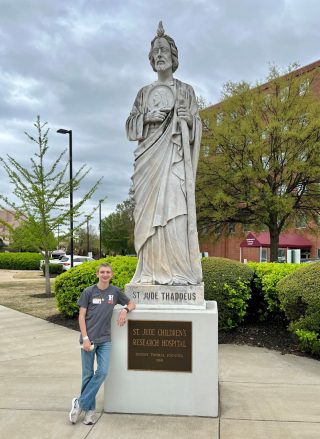
Luke in Memphis
Punch. “Two more hours.”
When they crossed the Louisiana state line, Luke and his dad did double-takes, trying to take in what they saw. “Wait, what is going on here?” Luke asked.
Uniformed officers were lined up on the side of the road, some standing next to SUVs, red or blue lights rotating atop, and others astride motorcycles.
They were there for Luke
“I just lost it at that point,” Luke said. “I was like, ‘This is crazy.’” His dad, Barry, a Louisiana State Trooper for 25 years, was taken aback. “It was overwhelming,” he said.
Barry and Luke were ushered into the back of a white limousine, a driver in jacket and tie holding open the door for them. Luke had never ridden in a limo before. He pulled a cold root beer from the cooler, slid back into the leather seat and stretched out his legs.
Punch. “One more hour.”
Those last miles flew by. Other vehicles on the highway changed lanes to clear the way for the motorcade.
It was the ride of a lifetime. After almost eight months of cancer treatment at St. Jude Children’s Research Hospital, Luke was almost home.
‘No rhyme or reason’
Luke had started vomiting in January last year. He’d vomit all day Sunday, be fine Monday and Tuesday, and then throw up after dinner on Wednesday. It would stop for a few days and start again.
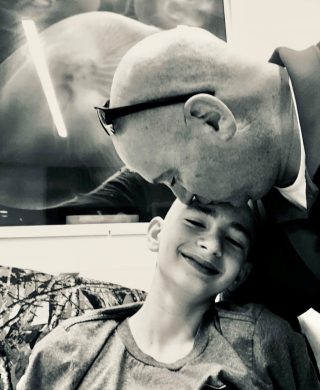
Luke and his father Barry
“There was no pattern,” Barry said. “No rhyme or reason.”
Luke’s pediatrician thought it was a stomach virus. It got so bad that Barry took Luke to the emergency room. An ultrasound of his stomach showed nothing wrong. Luke’s blood tests were normal.
But Barry told his wife, Jenn, “I’m afraid there is something very, very wrong.” He felt like it was something to do with Luke’s head. Something serious.
“Don’t think that,” Jenn said.
In March 2021, tests at a pediatric gastroenterologist showed sludge in Luke’s gallbladder, a possible precursor to gallstones. Luke had his gallbladder out. The vomiting didn’t stop.
Three days after the surgery, Luke was in the hospital, the four incisions on his abdomen straining painfully each time he retched. More tests. But still no answers.
‘Can we look at his head?’
Barry was asleep in a chair in Luke’s hospital room on May 30, 2021, when Luke’s doctor asked, “Hey, buddy, you ready to go home?”
No, Luke told him. “I’m really sick.”
“Can we do something else?” Barry asked the doctor. Because he’d had that feeling, Barry asked, “Can we look at his head?”
Luke was wheeled away for a computerized tomography, or CT, scan of his head.
Luke’s mom, Laura, was there, so Barry left to shower and take Jenn and their 6-year-old daughter, Hadley, out to eat crawfish.
Barry’s phone rang before they could leave for dinner. It was Laura, and she was crying. She choked out the words: “Luke has a brain tumor.”

“It felt like all the air in the house got sucked out,” Barry said. “It was complete terror.”
On his phone’s screen, Barry looked at the images from Luke’s CT scan. There was no missing it: a clearly defined mass, white against the gray of Luke’s brain, and the size of a golf ball.
“It was almost not even believable,” Barry said. He and Jenn rushed to the hospital.
The doctor had only told Luke, “There’s a spot on your head.” Now, Luke sat on his hospital bed, feeling his scalp for lumps. He asked his stepmother, who’s a nurse, “Hey, Jenn, is this it?”
“No, baby,” she told him. “That’s not it.”
Luke dropped his hands from his head. “Is it in my brain?”
“Yeah, baby, it’s in your brain.”
‘Something that shouldn’t be there’
The next day, they met with a pediatric neurosurgeon who studied Luke’s MRI scans taken that morning. “I’ve done enough of these to know I’m looking at medulloblastoma,” Barry said she told them.
Medulloblastoma is a rare cancerous brain tumor. Luke’s tumor was putting pressure on his brain and triggering vomiting. She scheduled Luke for surgery in the morning.

Luke was scared. “It felt like something had just crawled in there. Something that shouldn’t be there,” Luke said. He wanted it out.
Luke’s family sat in the waiting room, counting down the hours. One. Two. Three. Barry would have given anything for Luke to be sitting next to him, punching his arm.
Four. Five. Six hours later, the doctor came out of the operating room and took off her mask. Barry saw that she was grinning.
She’d removed the entire tumor.

While Luke was in the intensive care unit, his doctor contacted St. Jude, where she had completed a fellowship under Amar Gajjar, MD, a world-renowned pediatric brain tumor expert.
Survival rates for medulloblastoma are 70 percent, or 60 percent if it spreads to the spinal cord. Luke needed treatment to target any remaining cancer cells.
St. Jude would be his best chance.
Finding hope at St. Jude
Luke had seen television commercials for St. Jude.
“I thought it was a place kids go when they’re really, really sick,” Luke said. He thought, “It must be bad if that’s where I’m going.”
When he met Dr. Gajjar the first time, Luke said the doctor put his hand on his shoulder, and told him, “Luke, I promise you, you are going to be OK.”
“That was all I needed to hear,” Barry said. “We were where we were supposed to be.”
Scans showed Luke’s cancer had not spread. He would need six weeks of radiation therapy and four months of chemotherapy.
Barry told Luke, “Bubba, this is going to suck. You’re not going to like it, but I promise you we’ll get through it. It’ll end.”
In their room at Ronald McDonald House, Luke was sprawled on the bed, exhausted from radiation therapy. “Dad?” he said.
Something told Barry what his son was going to ask.
“I kind of knew the question was coming,” Barry said. “I prayed about it and prayed about it.”
Now Luke asked: “Why me?”
“Why not you, bubba?” Barry said. “This is your journey. You’re no more or less special than anyone else.” There was no rhyme or reason.
Luke could be sad, or mad, but his dad wouldn’t let him feel sorry for himself. Not after seeing other patients, many younger and worse off than Luke.
Still, there were times when Barry would tell Luke he needed a soda and walk down the hallway. He didn’t want his son to see him cry.
Just before Luke was born, Barry started the annual Heart of Blue Charity Auction, auctioning sports and music memorabilia to benefit the Louisiana State Police Troop G Grant-A-Wish program for kids with life-threatening illnesses.
Now it was his kid.
Fighting day-by-day
Luke was exhausted and nauseated. His hair fell out.
“That was ugly,” Barry said, nudging Luke.
“I looked better than him,” Luke said, nudging his dad back. Barry ran his hand over his bald head, chuckling.
“For the most part, he kept a positive attitude,” Barry said. Luke joked with hospital staff. When a nurse told him, “We’re going to do your hearing test,” Luke said, “Huh?”
Some days were harder.
“There were times Luke didn’t want to do it anymore. He didn’t want to keep fighting,” Barry said.
Luke remembers just wanting to go home. He wanted to go to school and play football. He wanted his life back.
Luke and his dad took it day-by-day instead of thinking of the months ahead. “Let’s get through Monday and then we’ll deal with Tuesday,” Barry said. “Fight for that day to get to the next.”
Luke turned 15 in treatment. He was at St. Jude for Halloween and Thanksgiving. His last chemotherapy treatment was Dec. 22, 2021. His family put Christmas on hold.
“There are moments where it does strike you down and brings you way down to the bottom,” Luke said. “But there’s always a top. There’s always tomorrow. The better day is coming.”
The better day came on Jan. 12, 2022. The day Luke got to go home.
He and Barry were excited but also a little scared — St. Jude felt safe. And something else that surprised them.
“I felt guilty about leaving those other babies up there who didn’t get to come home the same time we did — or at all,” Barry said. “As happy as we were, it didn’t seem fair.”
‘Welcome home, Luke’
As the motorcade pulled into Luke’s neighborhood, family, friends and neighbors lining the streets cheered and held up signs: “Welcome home, Luke,” “We are proud of you!” and “Fight like Luke.”
“I started tearing up,” Luke said. He got out of the limousine wearing a mask, a cap on his bald head, the port in his chest and feeding tube in his belly hidden under his sweatshirt.
Luke hugged family and friends and shook hands with the mayor. His dad told a local news station how grateful he was for St. Jude. “They saved our son,” Barry said.
Now they were home. For Luke, everything was wonderfully familiar, but also different.
“Right when I got home, it was like I never left really,” Luke said. So much was the same.
His chore list. Family dinners. His 16-year-old brother, Amos, dropping his dirty clothes on Luke’s side of their shared bedroom.
Some things were different.
Luke couldn’t go back to school. Not with his compromised immune system. A teacher came to his house every Friday.
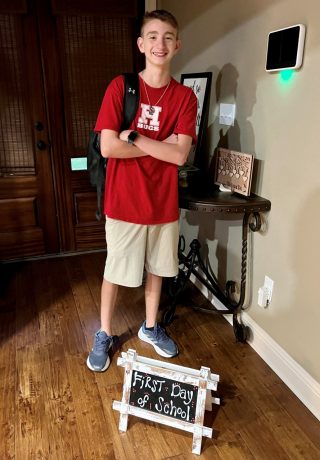
Luke's compromised immune system prevented him from going back to school
He had kept up with his freshman classmates with the help of teachers at St. Jude, maintaining his straight-A average even during treatment.
Luke couldn’t play football either. Not for at least a year, per doctor’s orders. He’s played since he was 5 and loves the game and loves being part of a team. “I really miss it,” Luke said.
His friends had changed, too. They’d gotten taller — one grew a mullet — and found new interests.
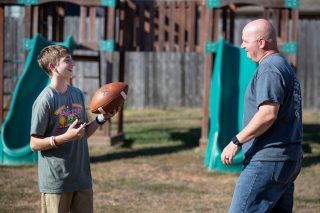
Luke couldn't play football for a year, per doctor's orders
“They kind of grew up without me,” Luke said. Only a few kept in touch while he was at St. Jude.
When Luke got home, he looked fragile. Thin. Bald. The kid with cancer, something that set him apart when all he wanted was to fit in.
Luke was different, too. Going through what he went through changes you.
“It puts a whole different perspective on life,” Luke said. Before he left St. Jude, a psychologist asked Luke how he would cope with friends who thought making a C in a class or getting turned down for a date was the end of the world.
Luke still can sympathize. But he knows there are worse things.
“I had to come to grips with some things that I don’t think most 15-year-olds have to come to grips with,” Luke said. That life isn’t always fair. That not everyone makes it.
“It’s a big realization,” Luke said. Family and friends are precious. Each day is a gift.
A life to live
Luke gets nervous when he returns to St. Jude every three months for check-ups. Not because of the MRIs or the spinal taps, but the fear that his cancer might come back.
“I don’t really think about it when I’m at home,” Luke said. But on that six-hour drive to St. Jude with his dad, once he’s back there, “It’s all more real.”
At Luke’s checkup in August his scans were clear. Doctors took the medical port out of his chest.
Now nothing marked him as a kid with cancer. He has a life to live.
His hair has grown back. He got taller and filled out.
A girl he’s known since sixth grade and liked since they were in freshman history and math together invited him to the movies. Elizabeth had texted Luke almost daily when he was at St. Jude.
He’s learning to drive, and he’s good at it, save one close call with some mailboxes. He’s still got his eye on his dad’s truck. “My truck, you mean,” Luke said. He turned 16.

Elizabeth and Luke
Turns out, there is an upside to being the kid with cancer.
This summer, Luke met Archie, Peyton and Eli Manning at a passing camp, Louisiana State University football players and the U.S. women's national volleyball team.
Barry was jealous. “Dad,” Luke told him, “All you have to do is get brain cancer.”
Luke plays videogames with his dad and teases, “You gonna beat the kid who just beat brain cancer?” Barry beats him anyway. “I’ve gotta keep him grounded,” he said.
The first day of his sophomore year, back at school in person, was perfect, even if he forgot his locker combination and didn’t have any classes with his girlfriend. His teachers were nice. The football coach invited him to condition with the team.
Barry and Luke are grateful for it all.
“We’re beyond blessed for what we’ve come through,” his dad said. “I get to keep my son.”
“And that means I can keep beating him up,” Luke said, and he punched his dad in the arm.



